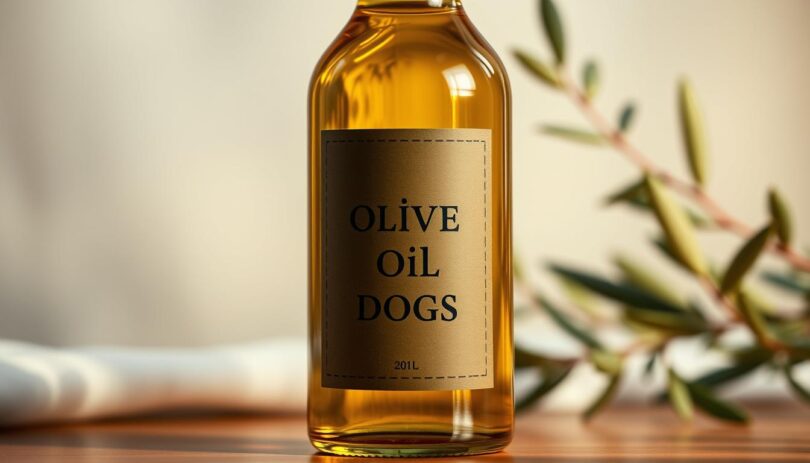Olive oil, a staple in Mediterranean cuisine, is now being considered for its potential benefits in canine diets. While traditionally used in human cooking, olive oil can offer advantages for dogs when used in moderation.
Experts like Dr. Christopher Reeder and Dr. Judy Morgan highlight that olive oil can improve skin health and digestion in dogs. However, it’s crucial to use it sparingly to avoid risks such as pancreatitis.
Consulting a veterinarian is essential before adding olive oil to your dog’s diet. They can provide guidance on safe amounts and ensure it aligns with your dog’s specific needs.
For more trusted nutrition advice, visit our guide on science diet dog food.
Why Olive Oil is a Healthy Addition to Your Dog’s Diet
Olive oil, known for its health benefits in human diets, is now gaining attention for its positive effects on canine health. Rich in monounsaturated fats and antioxidants, it supports overall well-being in dogs.
Nutritional Profile and Dietary Importance
Olive oil is packed with healthy fats that provide energy and support the absorption of essential vitamins. These fats also contribute to maintaining healthy skin and a shiny coat, making it a valuable addition to your dog’s meals.
Extra Virgin vs. Refined Options
Extra virgin olive oil, being minimally processed, retains more nutrients and antioxidants compared to refined varieties. It’s a better choice for your dog’s diet, offering superior health benefits without unnecessary additives.
Incorporating a small amount of olive oil into your dog’s food can enhance their diet by providing healthy fats and antioxidants. This addition helps maintain a balanced diet while keeping calorie intake in check, supporting overall health and vitality.
Can Dogs Have Olive Oil? Expert Perspectives and Guidelines
According to veterinarians like Dr. Christopher Reeder and Dr. Judy Morgan, olive oil can be a beneficial addition to a dog’s diet when used properly. They emphasize that moderation is key to avoiding potential health risks.
Veterinarian Insights and Recommendations
Veterinarians suggest starting with a small amount of olive oil and gradually increasing it while monitoring your dog’s reaction. This approach helps identify any adverse effects early on. They also recommend consulting a vet before making any changes to your dog’s diet.
Dr. Lisa Fox notes that introducing olive oil slowly allows your dog’s digestive system to adjust, reducing the risk of gastrointestinal issues. This cautious method ensures your pet can tolerate the new ingredient without discomfort.
Proper Dosage for Different Dog Sizes
The general guideline is 1 teaspoon of olive oil per 20 pounds of body weight. For example, a small dog weighing 10 pounds should get about half a teaspoon, while a larger dog weighing 40 pounds can have 2 teaspoons. Always adjust the dosage based on your vet’s advice to meet your dog’s specific needs.
For more information on safe dietary changes, visit our guide on dog food recalls to ensure your pet’s meals are safe and nutritious.
Health Benefits of Olive Oil for Canine Well-Being
Olive oil is a natural source of healthy fats and antioxidants that can offer several benefits for your dog’s health. Rich in monounsaturated fats, vitamin E, and polyphenols, it supports skin health, digestion, and overall vitality.
Improving Skin, Coat, and Overall Vitality
The essential fatty acids in olive oil, such as omega-3 and omega-6, help maintain a shiny coat and healthy skin. These nutrients can reduce shedding and improve skin conditions, making your dog’s fur look vibrant and feel soft.
Supporting Digestive Health and Weight Management
Olive oil acts as a mild laxative, easing constipation and promoting regular bowel movements. It can also aid in weight management by providing a feeling of fullness, helping your dog maintain a healthy weight without overeating.
Long-Term Disease Prevention and Antioxidant Effects
The antioxidants in olive oil, such as polyphenols, help reduce inflammation and protect against chronic diseases. Regular, moderate use may prevent conditions like heart disease and certain cancers, promoting long-term health for your dog.
For more trusted nutrition advice, visit our guide on scientific diet dog food to ensure your pet’s meals are safe and nutritious.
Potential Risks and Precautions with Olive Oil
While olive oil can be a healthy addition to your dog’s diet, it’s important to be aware of the potential risks. Overconsumption can lead to serious health issues, making moderation essential.
Overconsumption and Caloric Considerations
Too much olive oil can result in excessive calorie intake, potentially causing weight gain and obesity. This is especially concerning since many dogs are already prone to weight issues.
Gastrointestinal and Pancreatitis Concerns
A high-fat diet, including excessive olive oil, can trigger gastrointestinal upset. Symptoms may include vomiting or diarrhea. In severe cases, it can lead to pancreatitis, which requires immediate veterinary care.
Always follow the recommended dosage and consult your veterinarian before making any changes to your dog’s diet. Monitoring your dog’s behavior and health after introducing olive oil is crucial to ensure their well-being.
How to Safely Incorporate Olive Oil into Your Dog’s Diet
Incorporating olive oil into your dog’s meals can be a great way to boost their health, but it requires careful planning. Start by mixing a small amount with their regular food to ensure a smooth transition.
Mixing Olive Oil with Regular Dog Food
Begin with a tiny amount, such as 1 teaspoon per 20 pounds of your dog’s weight. For example, a 10-pound dog should start with half a teaspoon. Mix it well with their wet or dry food to avoid clumping and ensure even distribution.
When adding olive oil to dry food, drizzle it gently to coat the kibbles evenly. For wet food, stir it in thoroughly to maintain consistency. This method helps prevent feeding difficulties and makes the experience enjoyable for your pet.
Monitoring Your Dog’s Reaction Over Time
After introducing olive oil, watch for any signs of digestive upset, such as vomiting or diarrhea. Keep a journal to track changes in your dog’s behavior, appetite, and stool quality. If you notice any adverse reactions, consult your veterinarian promptly.
Regular monitoring is key to ensuring your dog tolerates the addition well. Adjust the amount based on their response and your vet’s recommendations. For more guidance on safe dietary changes, visit our dog food recall information page.
Remember, moderation is crucial. Excessive olive oil can lead to weight gain or pancreatitis. Always prioritize your dog’s health by maintaining a balanced diet and seeking professional advice when needed.
Final Thoughts on Supplementing Your Dog’s Diet with Olive Oil
When considering olive oil as a supplement for your pet, it’s important to balance the benefits with potential risks. Olive oil offers advantages like improved skin health and digestion, but moderation is key to avoiding issues like weight gain or pancreatitis.
Always start with small amounts and monitor your pet’s reaction. Consulting a veterinarian ensures you’re making a safe choice for your pet’s specific needs. By being mindful of portion sizes and your pet’s response, you can enhance their diet responsibly.
In conclusion, olive oil can be a healthy addition when used wisely. Prioritize your pet’s well-being by maintaining a balanced diet and seeking expert advice. With careful consideration, you can make informed decisions that support your pet’s health and happiness.
FAQ
Is it safe for dogs to consume olive oil?
Yes, in moderation, olive oil can be safely added to a dog’s diet. It offers health benefits like improving skin and coat health, but always consult a veterinarian for the right amount.
How much olive oil should I give my dog?
The amount varies by size. Small dogs might start with 1/4 teaspoon daily, while larger dogs can have up to 1 teaspoon. Always consult your vet for personalized advice.
What are the benefits of olive oil for my dog?
Olive oil is rich in healthy fats and antioxidants, which can enhance skin health, improve digestion, and support weight management in dogs.
Can I use any type of olive oil for my dog?
Extra virgin olive oil is recommended due to its higher quality and fewer processing steps, ensuring more nutrients for your dog’s health.










Leave a Comment